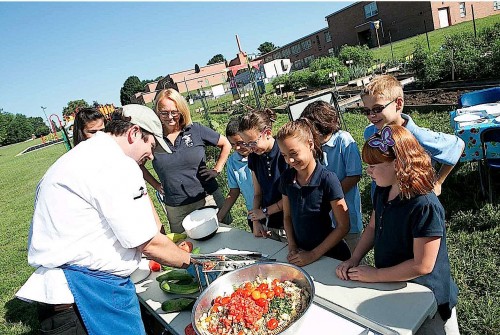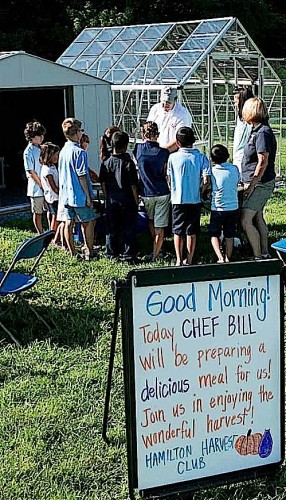
Smart Partners’ Bill Scepansky prepares pasta salad with students from Hamilton Elementary School in the School District of Lancaster. (Photo: Lancaster County magazine/Nick Gould)
I’ve known Bill Scepansky since his days as corporate chef and culinary consultant with a company for which we provided public relations services. Bill, who trained at the Culinary Institute of America, was an essential part of the public relations successes we had.
Bill became a regular contributor to abc27’s morning program and wrote a series of weekly features for the Lancaster New Era, among numerous other efforts we worked on together.
We have kept in touch through the years, including the past five as he and his wife, Karen, launched their own company, Smart Partners LLC. School programs are their primary focus, from training food service workers to helping in the development of more healthful menus to getting students excited about trying new foods that are delicious and nutritious.
Bill’s a passionate, knowledgeable foodie, but his real talent is his ability to connect with people. To kids, he’s a “rock star,” as one school food service director described him. He introduces students to dishes such as ratatouille; when I was in elementary school, they actually served us fried baloney cups.
My experience was nothing like the student-run garden that Bill described in his latest contribution to Lancaster County magazine. Under the guidance of principal Paula Wilson, Hamilton Elementary School in the School District of Lancaster has developed a garden project that this year comprised 31 raised beds yielding everything from tomatoes and Brussels sprouts to melons and kidney beans.
‘Helping your own farmers’
Bill quotes Wilson: “Our goal was to demonstrate to students that a tomato doesn’t originate on a shelf in the grocery store.”
What better way for students to learn than through the hands-on experience of growing their own healthful produce? Of course, not every school can or wishes to operate its own garden. But schools and students are getting to know their local farms as part of Smart Partners’ efforts, which are consistent with the national Farm to School movement.
“Where the hot button a couple years ago was more fruits and vegetables, now this has morphed into grains and legumes,” Bill told me. “But to take it to the next step, to increase the nutritive value and benefit your local economy and all the other great benefits that you get from eating product that is local, there’s been this big movement for schools to source from local farmers.”
Smart Partners connects schools from across Pennsylvania and beyond with local farms. Smart Partners helps the schools with challenges such as quality and logistics; the company helps the farms by developing recipes and other ways to “feature market these fresh products in ways that the kids are going to say, ‘Wow, there is a difference. These things do taste better when they’re coming from our local fields.’
“And also to tell the (story) of the farms. The farmers who are doing all this hard work are right in our back yards. And why in the world would we want to be buying product from California when we’ve got far better product that’s allowed to ripen or mature a lot more. Packaging is a lot less because it doesn’t have to ship as far.
“And, again, you’re helping your local economy out. You’re helping your own farmers. Why invest in California farms when we have people who need to make a living here.”
I think Bill’s on to something when he talks about the farmer’s role in this discussion about better eating, particularly relative to children. The more removed the majority of us get from farming, the less we seem to appreciate what it teaches us about hard work, stewardship of our land, and what we put into our bodies.
Taking baby steps
Echoing Wilson, the school principal, Bill noted the need to educate children about the origin of fruits and vegetables. They think lettuce “grows in a bag” and that peas only come in cans.
Bill recognizes that this is a process, one that will take baby steps.
“Can you imagine any school in their right mind that would just cook eggplant and zucchini and squash and tomatoes and all that stuff and just pop it on the (cafeteria) line? Who’s going to eat that?
“But you put some personality behind it and you offer a little bit of the taste before it’s featured on the menu. The sampling process, that’s a big investment that pays off. Because then you’re opening the kids’ eyes up not only to great food but also, ‘Hey, good stuff is coming from this kitchen. I trust them and I’m going to try the next obscure thing that I might have been scared about.’ ”
That’s Bill’s take.
Or you could do it my way: threaten the kids with fried baloney cups.



